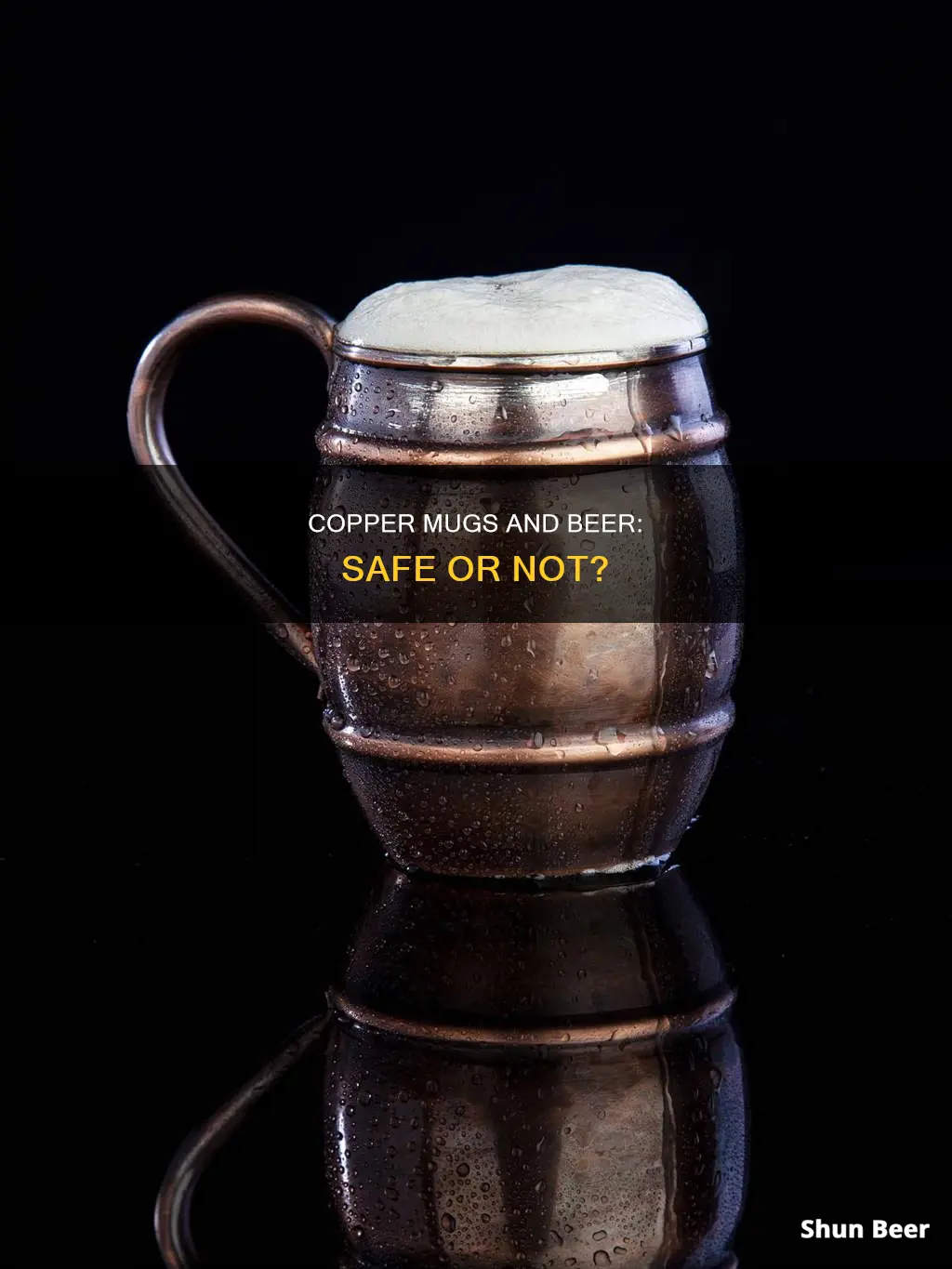
Copper mugs are a popular choice for serving and drinking beer, with many enthusiasts claiming that copper enhances the taste of beer and keeps it colder for longer. Copper mugs have impressive thermal dynamics, and their high thermal conductivity properties can keep beer colder than glass bottles, pint glasses, or aluminium cans. However, it is important to note that concerns have been raised about the potential health risks associated with drinking acidic beverages from copper mugs. While copper poisoning is unlikely, it is recommended to use copper mugs for non-acidic drinks to avoid any potential leaching of copper.
What You'll Learn
- Copper mugs are safe to drink from, but concerns about copper toxicity remain
- Copper mugs are lined with another material to prevent copper exposure and toxicity
- Copper has antimicrobial properties, making it harder for bacteria and viruses to survive
- Copper can enhance the taste of beer and has impressive thermal dynamics
- Copper mugs are ideal when you need to chill your drink rapidly and keep it cold for longer

Copper mugs are safe to drink from, but concerns about copper toxicity remain
Copper mugs have been used for centuries, dating back to ancient civilizations that revered copper for its antimicrobial properties and ability to kill waterborne bacteria. Today, they are commonly used for serving cocktails like the Moscow Mule, which consists of vodka, ginger beer, and lime juice. While copper mugs are generally safe to drink from, concerns about copper toxicity have been raised, prompting a closer examination of the potential risks associated with their use.
The primary concern surrounding copper mugs is the possibility of copper leaching into acidic drinks, such as the Moscow Mule, which has a pH level below 6.0. According to the Alcoholic Beverages Division of the State of Iowa, copper and copper alloys can be poisonous when consumed, and copper mugs are prohibited from coming into contact with foods that have a pH level below 6.0. This is because when copper comes into contact with acidic foods or beverages, copper ions can be released, potentially leading to copper poisoning. Symptoms of copper poisoning include vomiting, stomach pains, confusion, drowsiness, and fainting fits.
However, it is important to note that the risk of copper toxicity from drinking out of a copper mug is relatively low. According to a study by the National Research Council (US) Committee, copper toxicity symptoms only occurred after ingesting 30 milligrams of copper per liter that had been sitting in an unlined, pure copper mug for hours. This means that a person would need to consume a significant amount of an acidic beverage that has been in contact with a copper mug for an extended period to experience copper poisoning.
To address the concerns about copper toxicity, many copper mugs used in bars and restaurants are lined with another material such as stainless steel, nickel, or tin. These lined copper mugs eliminate the risk of copper exposure and copper toxicity while still providing the aesthetic appeal and thermal properties of copper. Proper care and maintenance of copper mugs are also essential to ensure their safety. This includes regular cleaning and avoiding the use of dishwashers, as well as keeping them dry and away from humid environments.
In conclusion, while copper mugs are generally safe to drink from, it is important to be aware of the potential risks associated with copper toxicity. The use of lined copper mugs and proper maintenance practices can help mitigate these risks, allowing individuals to enjoy the benefits of copper mugs while minimizing any potential health concerns.
The Magic Behind Beer Engines: How Do They Work?
You may want to see also

Copper mugs are lined with another material to prevent copper exposure and toxicity
Copper mugs are often used for serving cocktails like the Moscow Mule, which consists of vodka, ginger beer, and lime juice. While copper mugs enhance the taste of such drinks and have impressive thermal dynamics, there have been concerns about copper toxicity.
The Alcoholic Beverages Division of the State of Iowa has warned that copper mugs may cause food poisoning as copper and its alloys can be poisonous when consumed. The FDA also asserts that copper should not come into contact with foods that have a pH level below 6.0, including vinegar, fruit juice, and wine. The Moscow Mule cocktail has a pH level well below 6.0, and the lime juice and ginger beer in the drink have a pH lower than 6.0, so it is deemed unsafe to consume this beverage from an unlined copper mug.
However, copper mugs lined with another material, such as nickel, stainless steel, tin, or copper-plated over these metals, can prevent copper exposure and toxicity. According to the FDA, copper may leach from an unlined copper mug into food and beverages with a pH lower than 6.0, and states like Iowa have banned the use of unlined copper mugs for such acidic drinks.
While copper toxicity is possible, it is highly unlikely in the case of copper mugs. A study by the National Research Council (US) Committee found that copper toxicity symptoms occurred only after ingesting 30 milligrams of copper per liter, which had been sitting in an unlined pure copper mug for hours. Therefore, it is improbable that a person would be exposed to such high levels of copper from a single drink in a copper mug. Nevertheless, some bar owners may prefer to use lined copper mugs to comply with state regulations and reduce health concerns.
Beer and the 9 Days: What's Allowed?
You may want to see also

Copper has antimicrobial properties, making it harder for bacteria and viruses to survive
Copper mugs have been a popular choice for serving and drinking beer, with many ale lovers opting for this method. Copper mugs are also commonly used for cocktails such as the Moscow Mule, which consists of vodka, ginger beer, and lime juice. While copper mugs enhance the taste of drinks and have impressive thermal dynamics, there are some safety concerns associated with their use.
The antimicrobial properties of copper extend to its ability to kill viruses and bacteria that come into contact with its surface. This means that copper mugs can provide an additional layer of protection against the transmission of certain pathogens. However, it is important to note that copper and copper alloys can be poisonous when consumed in large quantities.
According to the Alcoholic Beverages Division of the State of Iowa, copper mugs may cause food poisoning if used with acidic foods or beverages with a pH level below 6.0. The Moscow Mule, for example, has a pH well below 6.0, and the lime juice and ginger beer in the cocktail can cause copper to leach into the drink. As a result, it is recommended to use copper mugs lined with another metal, such as nickel or stainless steel, for such acidic drinks.
While the potential for copper poisoning from drinking beer or cocktails in a copper mug is generally low, it is important to be aware of the risks and take appropriate precautions. Proper care and maintenance of copper mugs, including regular cleaning and avoiding their use with highly acidic drinks, can help ensure a safe and enjoyable drinking experience.
Exploring Salt Springs Recreation Area with a Beer
You may want to see also

Copper can enhance the taste of beer and has impressive thermal dynamics
Copper mugs are an increasingly popular way to serve beer. Copper is known for its impressive thermal dynamics, which can rapidly chill and keep drinks cold for longer. Copper mugs can keep beer colder than glass bottles, aluminium cans, or even frosted steins. This is due to copper's high thermal conductivity, which is almost 400 times higher than that of the average pub cup.
Copper mugs are also believed to enhance the taste of beer. The metal has been shown to have antimicrobial properties, which can kill harmful bacteria and improve digestion. Additionally, copper can aid in the absorption of iron, support thyroid health, and regulate the kidneys and liver. According to Ayurveda, an ancient system of medicine, drinking water from a copper vessel is known as "Tamra Jal" and is believed to balance the three doshas (Vata, Pitta, and Kapha).
Copper mugs are generally safe to drink from, and the risk of copper toxicity is low. However, concerns have been raised about the potential for copper poisoning, especially when copper mugs come into contact with acidic foods or drinks. The FDA and the Alcoholic Beverages Division, State of Iowa, have issued advisories against using unlined copper mugs for cocktails like the Moscow Mule, as the lime juice and ginger beer in these drinks have a pH level below 6.0, which can cause copper to leach into the beverage. To address this concern, many copper mugs are lined with stainless steel, nickel, or tin, or are plated over with these metals.
Rockport Beach: Beer Drinking Allowed or Not?
You may want to see also

Copper mugs are ideal when you need to chill your drink rapidly and keep it cold for longer
To take advantage of copper's thermal properties, place your copper mug in the freezer for at least 30 minutes to an hour before pouring your drink. The copper will cool down your drink to the perfect temperature in minutes, even if it was lukewarm to start. This rapid cooling effect is especially useful if you want to chill a drink without watering it down with ice.
Copper mugs are often used for cocktails like the Moscow Mule, which is made with vodka, lime juice, and ginger beer. However, copper mugs are also popular for drinking beer. In fact, beer has been consumed from metal mugs, known as steins, for centuries. Copper mugs are a great option for beer drinkers who want to keep their beverage cold without having to use a glass bottle or aluminium can.
It's important to note that copper mugs are generally safe to drink from, but there are some concerns about copper toxicity. Copper can leach into acidic drinks, but the amount is usually negligible and not harmful unless consumed in very large quantities over a long period. To avoid any potential health risks, it's best to use copper mugs for non-acidic drinks and to clean them regularly.
Understanding Beer Flash Coolers: Science Behind the Froth
You may want to see also
Frequently asked questions
Yes, it is safe to drink beer from a copper mug. Copper mugs are safe to drink from and are ideal when you need to chill your drink rapidly and keep it cold for longer.
Copper mugs are great for keeping your drink cold. They also have antimicrobial properties, which can help protect you from viruses such as COVID-19.
Drinking water stored in copper vessels can provide various health benefits, including improved digestion, better cardiovascular health, and improved skin health.
Keep your copper mug out of the dishwasher and avoid leaving it in humid environments. Clean it regularly to maintain its antimicrobial properties and prevent any buildup of harmful residues.







